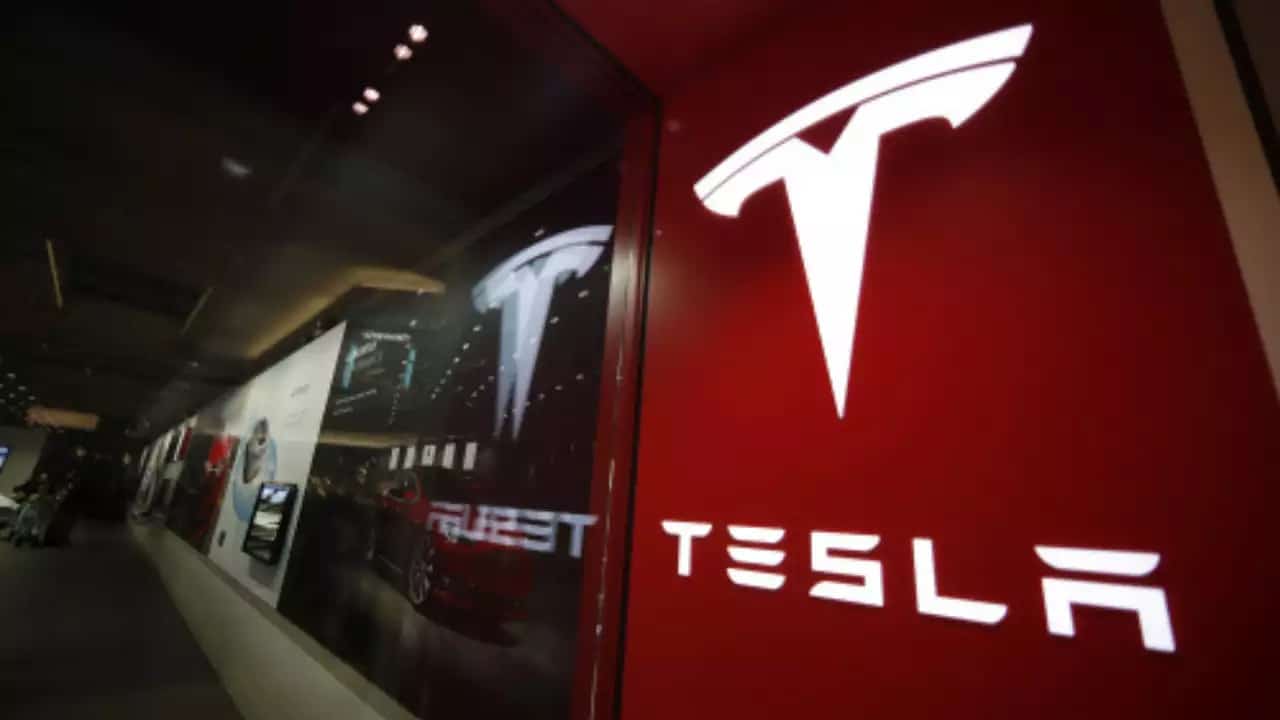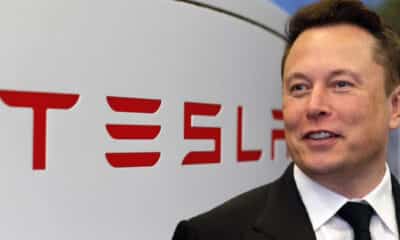Business
Tesla Shares Plunge To Wipe Out $73 Billion In Market Value, After Dour Earnings Call

Tesla shares fell as much as 11% after the market started Thursday, wiping $73 billion off the company’s market worth just hours after warning of slowing growth in electric car sales and an existential threat from Chinese rivals.
In an earnings presentation Wednesday, the world’s most valuable automaker stated that its sales growth this year “may be notably lower” than last year as it proceeded to develop the “next-generation” vehicle, which is likely to be a lower-cost model.
While Tesla announced a significant 38% increase in deliveries last year compared to 2022, it had previously projected a 50% annual growth rate over several years.
Tesla Shares Plunge To Wipe Out $73 Billion In Market Value, After Dour Earnings Call
Tesla’s financial reports for the fourth quarter were likewise disappointing, with adjusted earnings per share falling 40% from a year ago and revenue rising 3% to $25 billion, falling short of market expectations.
The company fell short of analysts’ earnings forecasts for the second quarter in a row, following a streak of better-than-expected results dating back to the beginning of 2021.
The stock doubled in price during 2023, but the gains came in the first half of the year, and Tesla shares were off to a slow start in 2024, sliding 16% before Wednesday’s results announcement. The stock is trading at its lowest level since April of last year.
Thursday’s intraday losses were similar to an extraordinarily big one-day drop of 11.4% in late December 2022. At the time, investors were concerned about Tesla’s sales and profitability and the state of the US economy.
Tesla’s fourth-quarter earnings also highlighted that profitability is under pressure. The company’s operating margin nearly halved to 8.2% from the same time in 2022, owing to increased costs associated with manufacturing the Cybertruck pickup. The new model began production around the end of 2023.
Tesla Shares Plunge To Wipe Out $73 Billion In Market Value, After Dour Earnings Call
Wedbush analyst Dan Ives said Tesla’s earnings call presented investors with “minimal answers” to the company’s declining profitability.
“We were dead wrong expecting Musk and team to step up like adults in the room on the call and give a strategic and financial overview of the ongoing price cuts, margin structure, and fluctuating demand,” he said in a note to investors on Thursday.
Threat from China
Tesla has been lowering costs for over a year to improve sales as it faces increased competition in China.
In the final three months of last year, China’s BYD outsold Tesla for the first time.
On Wednesday, Musk told analysts that Chinese carmakers were “the most competitive car companies in the world” and “will have significant success outside of China.”
“Frankly, I think if there are no trade barriers established, they will pretty much demolish most other car companies in the world,” he said.
Tesla Shares Plunge To Wipe Out $73 Billion In Market Value, After Dour Earnings Call
Rising competition from BYD and other Chinese automakers has prompted an anti-dumping probe by European officials, which could result in increased duties on Chinese car imports. Dumping is the practice of exporting goods to a country at prices that are lower than their actual cost.
Looking up?
While Tesla’s earnings were “disappointing and uncharacteristic,” Garrett Nelson, a senior equities analyst at CFRA Research, believes that releasing its lower-cost vehicle in the coming years will offer “the catalyst the stock needs,” he wrote in a note Wednesday.
Ben Barringer, a technology analyst at Quilter Cheviot, is likewise bullish. He believes the broader economic situation is beginning to swing in Tesla’s favour.
“Interest rates will start to drop. This will be a significant benefit to Tesla and the larger automotive industry, as buyers choose to finance their vehicles,” he wrote in a note Thursday.
SOURCE – CNN
Business
Bitcoin Goes Over $80,000 As Buyers Guess Whether Trump Will Run For President.

(VOR News) – The following day, Bitcoin achieved a new record high as a consequence of traders’ wagers on the potential benefits of Donald Trump’s return to the White House for the cryptocurrency.
This was an additional factor contributing to Bitcoin’s recent record-breaking performance.
This resulted in Bitcoin’s first-ever record-breaking high.
The digital currency’s inaugural transaction, valued at eighty thousand dollars, was executed one hundred twenty minutes after twelve o’clock in the afternoon (1200 GMT). This occurred shortly after the timepiece reached twelve.
The conviction that President Trump may reduce laws on digital currencies has increased as a result of his victory in the presidential election that occurred in the United States on Tuesday. This conviction has been bolstered by his election victory. Since the election was won by the Republican nominee, Trump, this mentality has been gradually cultivated.
On Wednesday, the price of bitcoin achieved a new all-time high of $75,000, surpassing the previous all-time high of $73,797.98, which was achieved in March. This item has attained the highest price to date.
It was widely believed that Trump was the politician who embraced Bitcoin during his campaign against Kamala Harris, the Democratic Party candidate. Harris was a candidate for the Democratic Party in the Senate campaign.
Donald Trump employed the term “hoax” to describe cryptocurrencies during his inaugural tenure as president of the United States. However, in the time that has passed since then, he has experienced a substantial change in his viewpoints, which has even resulted in the creation of his own committee platform.
In addition to his pledge to establish the United States of America as the “bitcoin and cryptocurrency capital of the world,” he has also committed to appointing Elon Musk, a tech entrepreneur and right-wing conspiracy theorist, to the role of overseeing a comprehensive investigation into the government’s wasteful practices.
Both of these commitments are components of his strategy to enhance the prosperity of the United States of America. It is crucial to acknowledge that he has made a commitment to both of these.
The administration of President Trump was responsible for the reduction of corporation taxes, which resulted in an increase in market liquidity and facilitated the investment in high-growth assets, such as cryptocurrencies. Through the administration of President Trump’s predecessor, this was accomplished.
The previous administration benefited from a decrease in the tax rate for Bitcoin companies.
In September, President Trump announced that he, his sons, and other organizations would be creating a digital currency platform known as World Liberty Financial. The development of this platform would also incorporate the participation of other businesses. The network would facilitate the conversion of digital currency into corporeal currency.
Nevertheless, it experienced an unsuccessful sales launch earlier this month, with only a small percentage of the tokens that were placed on the market being purchased by consumers. This incident transpired earlier this month. From this, it is possible to infer that the launch was unsuccessful.
Cryptocurrencies have been the subject of numerous news articles since their inception. The FTX exchange platform is the most notable of the numerous industry stalwarts that have fallen, and these stories have covered a wide variety of subjects, including the immense volatility of their pricing. Numerous topics have been addressed in these narratives.
According to reports that circulated in the days preceding the election, he made history by becoming the first former president to utilize bitcoin to conduct a transaction. Donald Trump achieved historical significance by conducting a transaction using bitcoin. This could be considered a significant accomplishment.
He accomplished this by purchasing hamburgers from a restaurant in New York City, which characterized the transaction as “historic.” He succeeded in achieving these objectives. Because of this opportunity, he capitalized on it.
Bitcoin, a digital currency, is transacted on the market every day of the week, including Sundays.
SOURCE: TET
SEE ALSO:
Subsidies for Electric Vehicles Cut as Consumer Interest Fades
Chewy Slides After Filing Shows 3rd-Biggest Shareholder, ‘Roaring Kitty,’ Sold His Stake
Canada CBC News CEO Catherine Tait Recalled to Parliamentary Committee
Business
Subsidies for Electric Vehicles Cut as Consumer Interest Fades

Pressure is building on Canada’s electric vehicle manufacturers, and several are rethinking their stance on E.V.s in favor of plug-in hybrids. Automobile manufacturers are now bracing themselves for an even more challenging era in the Canadian market for electric vehicles (E.V.s).
President Kristian Aquilina of General Motors Canada claims that support and expectations are misaligned because the Canadian government is reducing subsidies for electric vehicles while trying to phase out gas-powered cars.
Manufacturers find pushing for an all-electric future in Canada increasingly difficult due to fewer consumer financial incentives and increasingly strict sales targets.
With subsidies totaling up to C$12,000 (about $8,500), Canadian consumers may save a tonne of money on electric automobiles. The federal government offers a rebate of up to $5,000 Canadian, and the provinces of Quebec and British Columbia provide further incentives of up to $7,000 and $4,000, respectively.

Ford lost about $132,000 US for every E.V. it sold in the first three months of the year.
Ontario, which eliminated rebates in 2018, had the lowest market share for electric vehicles compared to Quebec and British Columbia, two regions that offered bigger incentives and thereby drove E.V. adoption in Canada.
Although this backing is dwindling, the province of Quebec has now declared that all subsidies will end in 2027. In June, the British Columbia government restricted incentives to a smaller subset of E.V. purchasers for “available funding” and higher-than-expected E.V. sales growth.
These reductions indicate a larger pattern: provincial governments reevaluate the sustainability of taxpayer-financed incentives for E.V.s as budget deficits widen.
With lofty goals to cut pollution from gas-powered cars and increase sales of electric vehicles, the Canadian government has reduced subsidies for these vehicles. Electric or plug-in hybrid vehicles will be mandatory for all new light-duty vehicle sales in Canada by 2035.

Some opposition critics say that B.C. needs to step up with incentives for consumers to buy used E.V.s.
To meet our intermediate goals, 20% of new sales must be electric vehicles (E.V.s) by 2026 and 60% by 2030. Car companies are already under a lot of pressure due to dwindling incentives and increasing demands, and the clock is ticking faster by the second.
In addition, these rules impose new forms of responsibility. Automakers that do not reach their provincial sales targets may be subject to financial fines imposed by provinces such as British Columbia.
Canadian manufacturers are already under financial pressure from federal compliance credit system standards, which they must meet or face deficits. This system gives them credit for electric vehicle sales and infrastructure improvements, but it’s not without its challenges.
“The timing is not necessarily lining up very well, in that the purchase incentive support comes off just as mandates and regulations start to bite,” GMC Canada President Kristian Aquilina told Bloomberg. “It must make a difference.
Therefore, we must consider that. Despite the cutbacks, Aquilina argued that the government’s investment in enhancing the charging infrastructure could benefit E.V. sales.
Related News:
Tesla Sales Fall As More Electric Vehicles Crowd the Market
Tesla Sales Fall Again As More Automakers Crowd Electric Vehicle Market
Business
Chewy Slides After Filing Shows 3rd-Biggest Shareholder, ‘Roaring Kitty,’ Sold His Stake

Washington — Chewy shares fell about 2% overnight Wednesday after a regulatory filing showed that Roaring Kitty, a meme stock trader, sold his interest in the online pet retailer.
According to a beneficial ownership document filed with the Securities and Exchange Commission on Tuesday, Roaring Kitty, whose legal name is Keith Gill, sold all his Chewy shares, totaling 6.6% of the company.
Chewy Slides After Filing Shows Third-Biggest Shareholder, ‘Roaring Kitty,’ Sold His Stake
Plantation, Florida-based Chewy dropped 1.9% after hours to $26.19 per share.
Gill, an investor at the core of the meme stock craze, bought more than 9 million shares of Chewy in July, making him the company’s third-largest stakeholder.
Gill built a name for himself in 2021 by rallying ordinary investors around GameStop. At the time, the video game shop was fighting to stay in business, and major Wall Street hedge funds and investors were betting against it or shorting the stock. But Gill and those who agreed with him altered GameStop’s direction by purchasing thousands of shares despite practically all acknowledged criteria indicating that the firm was in deep peril.
 Chewy Slides After Filing Shows Third-Biggest Shareholder, ‘Roaring Kitty,’ Sold His Stake
Chewy Slides After Filing Shows Third-Biggest Shareholder, ‘Roaring Kitty,’ Sold His Stake
That triggered what is known as a “short squeeze,” in which large investors who had bet on GameStop were obliged to buy its swiftly increasing stock to offset significant losses.
Gill has expressed confidence in GameStop Chairman and CEO Ryan Cohen’s ability to revamp the company following his success at Chewy. Cohen cofounded Chewy in 2011 and stepped down as CEO in 2018.
SOURCE | AP
-

 Tech4 weeks ago
Tech4 weeks agoDocuments Show OpenAI’s From Nonprofit to $157B Valued Company Long Trip
-

 Business4 weeks ago
Business4 weeks agoExperts Are Perplexed By Tesla’s Sporty, Two-Seater Robotaxi Design.
-

 Tech3 weeks ago
Tech3 weeks agoApple Unveiled A Fresh Glimpse Of Their AI Featuring ChatGPT Integration.
-

 Tech4 weeks ago
Tech4 weeks agoConnection Problems With The App Store Are Stopping Customers From Downloading Apps.
-

 Tech4 weeks ago
Tech4 weeks agoDocuments Show OpenAI’s Long Journey From Nonprofit To $157B Valued Company
-

 Tech3 weeks ago
Tech3 weeks agoThe Meta Foundation Launches a New Anti-Sextortion Campaign on Instagram.

:max_bytes(150000):strip_icc()/GettyImages-1768359670-982f85174a5542f6b7dcf355997dfd83.jpg)

































